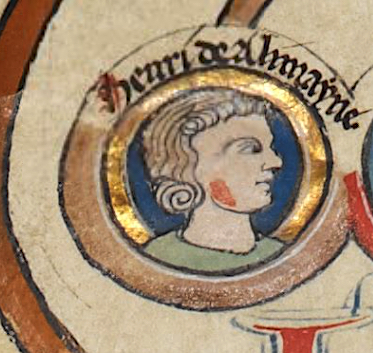Henry of Almain & His Tragic Fate
While attending mass at the Chiesa di San Silvestro (also called the Chiesa del Gesù) in Viterbo on 13 March 1271. Guy and Simon de Montfort discovered that their cousin Henry of Almain (son of Richard, Earl of Cornwall) was in Viterbo and in revenge for the deaths of their father and brother at Evesham, they murdered Henry while he clutched the altar, begging for mercy. "You had no mercy for my father and brothers", was Guy's reply. This murder was carried out in the presence of the Cardinals (who were conducting a papal Election), of King Philip III of France, and of King Charles of Sicily. For this crime the Montfort brothers were excommunicated, and Dante banished Guy to the river of boiling blood in the seventh circle of his Inferno (Canto XII). .The deed is mentioned by Dante Alighieri, who took it upon himself to place Guy de Montfort in the seventh circle of hell in his masterpiece, The Divine Comedy, which was written at least 40 years after Henry's death.
The news reached England, and King Henry III dispatched a clerk of the royal household to inform the northern counties and Scotland about the excommunication. Edward I Longshanks, Henry's cousin and close companion swore bloody vengeance upon all of Simon de Montfort's sons, even on Amaury the priest who wasn't involved. Simon the younger died that year, reportedly of a tertian fever, while Guy managed to appeal to the pope (with the aid of his father-in-law), resulting in his return to the church. Pope Gregory X wrote a letter (29 November 1273) to King Edward from Lyons, where he was preparing for an ecumenical council, that Cardinal Riccardo Annibaldi and Cardinal Giovanni Orsini were still in Rome and had been ordered to find a secure place of imprisonment in the territories of the Church for Guy de Montfort. Henry was married to Constance of Béarn (died 1299), eldest of four daughters of Gaston VII of Montcada, Viscount of Béarn, on 5 May 1269 at Windsor Castle. No children came of this union, and thus his half-brother, Edmund, became the heir apparent of their father. He was buried at Hailes Abbey.
 |
| The Murder of Henry of Almain by the De Montforts |
Source: Wikipedia

Comments
Post a Comment